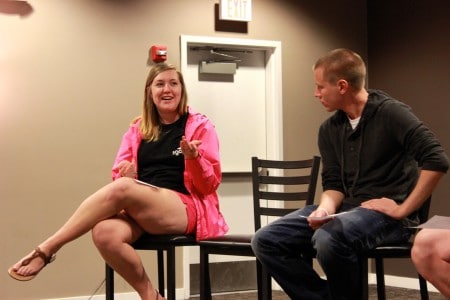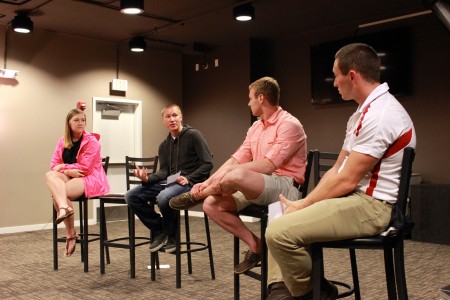PEACC, or Prevention, Education, and Advocacy on Campus and in the Community, has a primary goal to help students who face interpersonal violence of all kinds. LaMont Johnson, the student programming and outreach coordinator, would like to add a sub-goal to PEACC: “Social justice dialogues through programming.”
Many of these programs take place around campus in the evening and are open for all to attend. They are intended to make students think about bigger issues involving the state and nation. On Wednesday evening, PEACC finished The Gray Area program, where they “talk about the iffy stuff.”
40 students packed into the Avenue room at Cardinal Towne discuss whether Guantanamo Bay Prison, or Gitmo, in Cuba should remain open or shut down. The discussion included a lead panel, and members in the audience also joined in the discussion. The panel consisted of graduate and undergraduate students, including Allison Krebs, David Payne, Aaron Young, and Jordan Adams and was moderated by the student leaders of PEACC.
The first question dove right into the messy subject and asked if Gitmo detainees should receive the same rights as United States inmates.
“Tough question because they are not citizens of the US,” Adams stated.
Krebs argued if America did not treat the detainees the same, it “puts us on the same level” as the terrorists.
The next question asked where the detainees would go if Gitmo closed. The panel seemed to like the idea of having an international prison for war criminals and terrorists.
The crowd, however, believed Gitmo should remain open and felt the United States needed to continue to run the detainee prison, even if it is not on United States soil.
It costs America $400-500 million a year to keep Gitmo running, and students discussed whether the amount is justified.
Young said, “It sounds like a lot to us, but the government has trillions of dollars. It’s just a drop in the bucket.”
As the discussion began to wind down, the questions became even grayer: should the United States be able to detain American citizens indefinitely and without trial if they are connected to a terrorist attack?
Young spearheaded this questions, saying, “If there is enough evidence to be detained, then there should be enough evidence for a trial.”
“You can’t pick and choose who has rights,” echoed Krebs.
The room seemed to also want a trial for citizens, but a different one than normal United States citizens have. They felt a military tribunal would be more suitable for terrorist activity than the same trial one gets for a DUI.
This feeling even continued for terrorists who were not citizens of America. The overwhelming majority believed it to be a basic human right to have a fair trial. Most preferred the military tribunal or some variation on it, but a trial nonetheless.
The final question took a poll: should Gitmo stay open?
Only one person in the room felt it should be closed while a handful of others thought it should stay open. The rest of the room felt it was a loaded question and had too many layers to be addressed with a simple yes or no answer.
Photos by Bailey Thomas / The Louisville Cardinal







